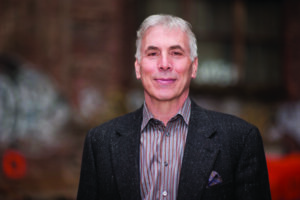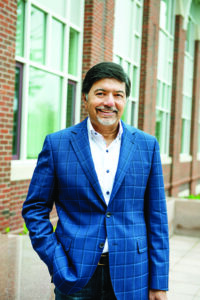Make Your Mission Greater than Profit
If your business focuses only on profit, you will eventually lag behind others who view the mission in a broader way and include enriching the lives of communities. This more conscious focus on caring cultures is the subject of Michael J. Gelb & Raj Sisodia’s new book, The Healing Organization: Awakening the Conscience of Business to Help Save the World.
If you’re the type of leader who focuses on more than profit, and cares about your people, you will identify with our discussion about becoming a healing leader.
I reached out to the authors to learn more about their perspective.
What is a healing organization? What traits do they have?
Most businesses are organized primarily to make money by exploiting a need or gap in the marketplace. For reasons that we document extensively in the book, this narrow profit orientation causes or exacerbates a great deal of suffering.
Some companies take a more enlightened approach by investing in corporate social responsibility initiatives, employee wellness programs, and charitable donations. At best, this partially mitigates the suffering they cause.
Healing Organizations are organized around the quest to alleviate suffering, elevate joy and promote healthy growth among all the people whose lives they touch. The premise is simple: When we understand and meet people’s real needs from a place of genuine caring, we catalyze healing in them, while at the same time healing ourselves and generating abundance. Businesses that are organized and managed around a noble, healing purpose are not only great places to work, they’re also beloved by customers, suppliers, communities and shareholders.
The Healing Organization isn’t about corporate social responsibility. It isn’t about having an employee wellness program. It isn’t about checking a few boxes on environmental stewardship or finding more humane tactics to squeeze out more profit. Rather, it’s a radical reimagining of the role of business in society. We make the case that business is fundamentally about healing. This is not a book about the business of healing; it is about business as healing.
Awaken Your Organization
What is driving organizations to “awaken”?
There is extraordinary suffering in the world, and businesses can no longer pretend that it is not their responsibility to do something about it.
We’re living in the most peaceful time in human history. Fewer people are being killed by murderers, in wars, even by terrorists. There’s less domestic violence, and less bullying. However, psychic suffering is rising. Nearly a hundred Americans die every day from opioid overdoses, adding to the half million that have died since 2000. 40 million of our fellow Americans over the age of 18 suffer from debilitating anxiety. Suicide rates in the US have risen 24% in the last 15 years.
Despite unprecedented global prosperity, nearly 15,000 children die from preventable causes every day and more than half the world’s population lives on less than $6 per day. And it’s becoming impossible to deny the stark reality of the danger we face through the corruption of our planetary ecosystem due to the way many still conduct business. We are experiencing unprecedented political divisiveness and pandemics of obesity, school shootings, and chronic disease. It’s clear that government isn’t going to solve these problems and neither will non-profits. It’s up to business to be the lead agent of change, and more and more leaders are awakening to that understanding.
We need healing in every aspect and every sphere. We need to heal ourselves, our families and our communities. We need to heal our companies, our primary focus here. We need to heal our countries; many countries today are more divided than ever before. We need to heal our planet, and heal all the life that’s on our planet.
Almost all of this suffering is unnecessary, and it serves no higher purpose. There is no inherent honor in needless suffering. As business leaders and human beings, how can we turn a blind eye to that suffering when we actually have the ability to do something about it?
Would you share an example of a company or two leading the way?
The Healing Organization is a book of inspiring stories about companies living this evolved dream of what business can be. Although none are perfect, they operate in a way that generates engagement and fulfillment for their employees, delight and loyalty for their customers, positive contributions to their communities and to the environment, and excellent returns for their owners and investors.
Appletree Answers is a call center company created through a “roll up” of smaller companies. At some point, the CEO, John Ratliff, discovered that there were two distinct categories of people in the company: 20% were salaried professionals, who were quite happy, highly engaged, and had a low turnover; the remaining 80% were hourly paid people who actually answered the phones. Employee turnover in this group was 118 percent a year, which means they lasted about nine months on average. Their employee engagement was in the low teens.
When he became aware of this stark contrast, John Ratliff was determined to do something about it. He wanted to improve their lives and recognize the financial distress that they’re under, figuring out how to pay them more and increase their engagement. This included actions like managers asking employees daily for suggestions for making their lives better. A simple change that made a big difference was providing employees with more comfortable chairs.
John recognized that life is really challenging for hourly employees, since most lack a financial cushion to be able to handle life’s unpredictable challenges. Non-events in the lives of salaried employees, such as their car hitting a pothole and requiring a new tire and rim, could become life-altering calamities in the lives of hourly-paid employees. Such employees were typically shown little empathy; instead, they were reprimanded for coming to work late, given a “black mark” against their record, and told that they would be terminated if they had two more such incidents. They would then be told, “Now go answer the phone and be nice to our customers.” No small order for someone with $160 in the bank whose life feels like it is falling apart.
 To help people in such situations, the company started a program called Dream On. They asked people, “Tell us if you’re facing a situation in your life where you need help.” For a couple of weeks, nobody responded, because most people are stoic; they don’t want to appear unprofessional by asking for help. Finally a woman came forward and said, “My ex-husband stopped paying alimony two weeks ago and I got evicted from our apartment last week. My children and I have been living in my car for a week. I just can’t do this to them anymore. I am so sorry, but I need help.” When John Ratliff read this note, the first thing he felt was a deep sense of shame. He thought, “I started this company, and a mother who works for me full-time is homeless. It took her a week to tell us about it. How is that acceptable?” They got her into a hotel that night, and helped her get an apartment, helped furnish it, helped with the deposit etc. Within a week after that, the floodgates opened up. People saw what had happened and dozens of stories came pouring out. A number of other people were also homeless and dealing with all kinds of extraordinary stress.
To help people in such situations, the company started a program called Dream On. They asked people, “Tell us if you’re facing a situation in your life where you need help.” For a couple of weeks, nobody responded, because most people are stoic; they don’t want to appear unprofessional by asking for help. Finally a woman came forward and said, “My ex-husband stopped paying alimony two weeks ago and I got evicted from our apartment last week. My children and I have been living in my car for a week. I just can’t do this to them anymore. I am so sorry, but I need help.” When John Ratliff read this note, the first thing he felt was a deep sense of shame. He thought, “I started this company, and a mother who works for me full-time is homeless. It took her a week to tell us about it. How is that acceptable?” They got her into a hotel that night, and helped her get an apartment, helped furnish it, helped with the deposit etc. Within a week after that, the floodgates opened up. People saw what had happened and dozens of stories came pouring out. A number of other people were also homeless and dealing with all kinds of extraordinary stress.
The results of John Ratliff’s healing leadership have been dramatic. Employee turnover among hourly workers fell sharply, and the company became one of the most desirable places to work in its industry.
Sometimes, businesses actually begin with an explicitly noble healing purpose. For example, Mark Donohue, Founder and CEO of LifeGuides, a Public Benefit Corporation, observed that a significant amount of suffering, even in a developed economy like the U.S., is related to what he terms “life challenges”—situations like caring for a mother with Alzheimer’s, having a child with an addiction, going through a divorce, or having one’s home burn down in the California wildfires. As he thought about the prevalence of these problems, he realized that there are many people who have dealt successfully with these difficult situations. He thought, “Perhaps there is a way to connect those in need with those who could help.”
Shortly thereafter, he met the founder of Match.com and an idea emerged: What if he could create an enterprise that pairs people who are going through life challenges with trained “Peer Guides” who have successfully overcome the same difficulty? Just like Match.com pairs people for love, and Doctors On Demand finds physicians for patients, Mark visualized creating “a platform for caring people to do extraordinary good,” and for those life guides to get paid a living wage for their efforts. This isn’t a non-profit; it is a viable business idea organized around a higher purpose.
Redefine Success
Talk about the process a company would take to redefine success.
Most companies define success narrowly as profits and shareholder return. But, at Barry-Wehmiller, based in St Louis, CEO Bob Chapman has transformed that notion, which was destroying many of the heartland industrial communities that he has helped to revitalize. His “truly human leadership” formula is simple and is expressed in a statement prominently displayed on the wall at the company’s headquarters in St. Louis:
We measure success by the way we touch the lives of people.
Not by power. Not by position. Not by money. Not by growth. Truly human leadership measures success by the way human lives are enriched and healed. Bob Chapman has acquired and transformed well over 100 companies using this approach and mindset. He has never sold a single business. Bob is the epitome of a healing leader.
This same ideal was championed by the legendary founder of Southwest Airlines, Herb Kelleher, who proclaimed:
The business of business is people—yesterday today and forever.
 It is that simple and that profound: everything else, including profits, should be viewed as a means to enable the flourishing of people and the planet.
It is that simple and that profound: everything else, including profits, should be viewed as a means to enable the flourishing of people and the planet.
Herb and Bob both realized that when we define success as achieving power, money, and position for ourselves, we almost always inflict significant and unnecessary suffering on others.
Healing Organizations are people-centric, “Truly Human” to use Bob Chapman’s term. In other words, they put the human case ahead of the numbers. They don’t sacrifice higher values for lower ones. For Healing Organizations, fealty to values is foremost and success metrics are focused on fulfillment measures for all stakeholders in the long term. Profitability is important but it is viewed more as an epiphenomenon rather than a raison d’etre.
The process of transforming a hurting organization usually begins with an awakening of conscience of a key leader at a moment of crisis.
Become a Healing Leader
How does one become a healing leader?
The translation of noble healing ideals into reality requires leadership. You cannot have a healing organization without healing leaders. And healing leadership demands a continuing commitment to healing oneself. In healing yourself, you can extend that healing to others.
 The amazing individuals we were privileged to learn from and feature in this book have all evolved through their own life experiences to arrive at a clear sense of themselves and what they are seeking to manifest in the world through their enterprises. In many cases, these leaders have found meaning in their own suffering and have sought to use the canvas of their businesses to create something that reflects the good, the true, and the beautiful as they have come to understand it.
The amazing individuals we were privileged to learn from and feature in this book have all evolved through their own life experiences to arrive at a clear sense of themselves and what they are seeking to manifest in the world through their enterprises. In many cases, these leaders have found meaning in their own suffering and have sought to use the canvas of their businesses to create something that reflects the good, the true, and the beautiful as they have come to understand it.
One lesson they all learned was to become aware of the attitudes, assumptions, and habits that cause unnecessary suffering and change those first.
All these leaders realized that the way you do what you do is as important as what you are doing. They want employees and their families to thrive because that is the right thing for them, not because they can get more out of them. As one of the leaders we profiled—Tami Simon, founder of Sounds True—expressed it, “The means, the path itself should always be life-giving.”
For more information, see The Healing Organization: Awakening the Conscience of Business to Help Save the World.


